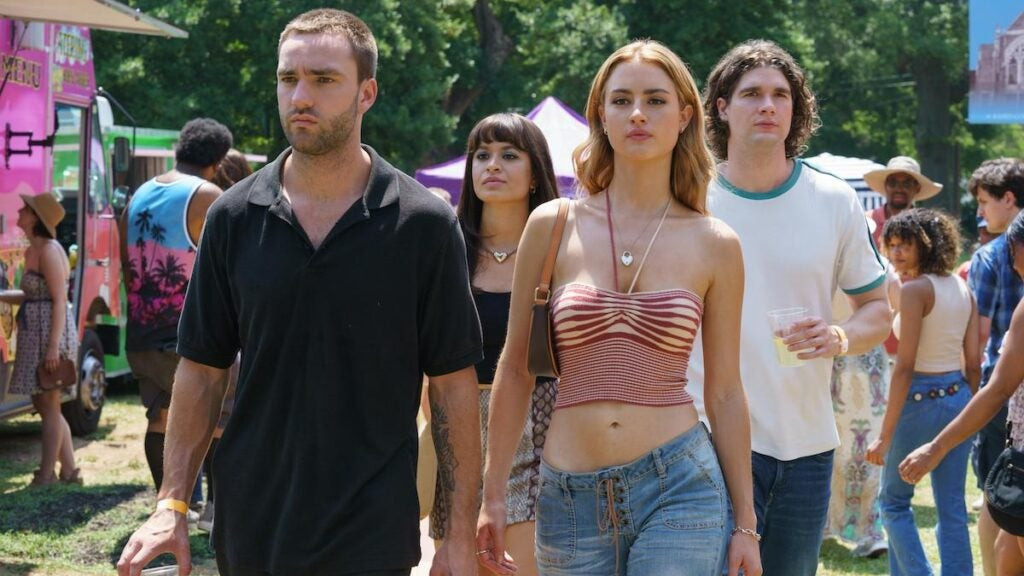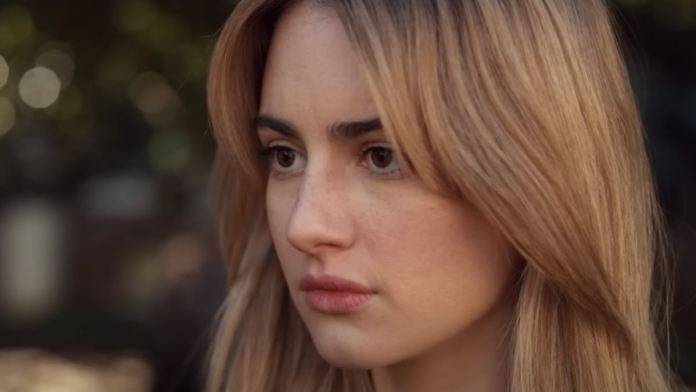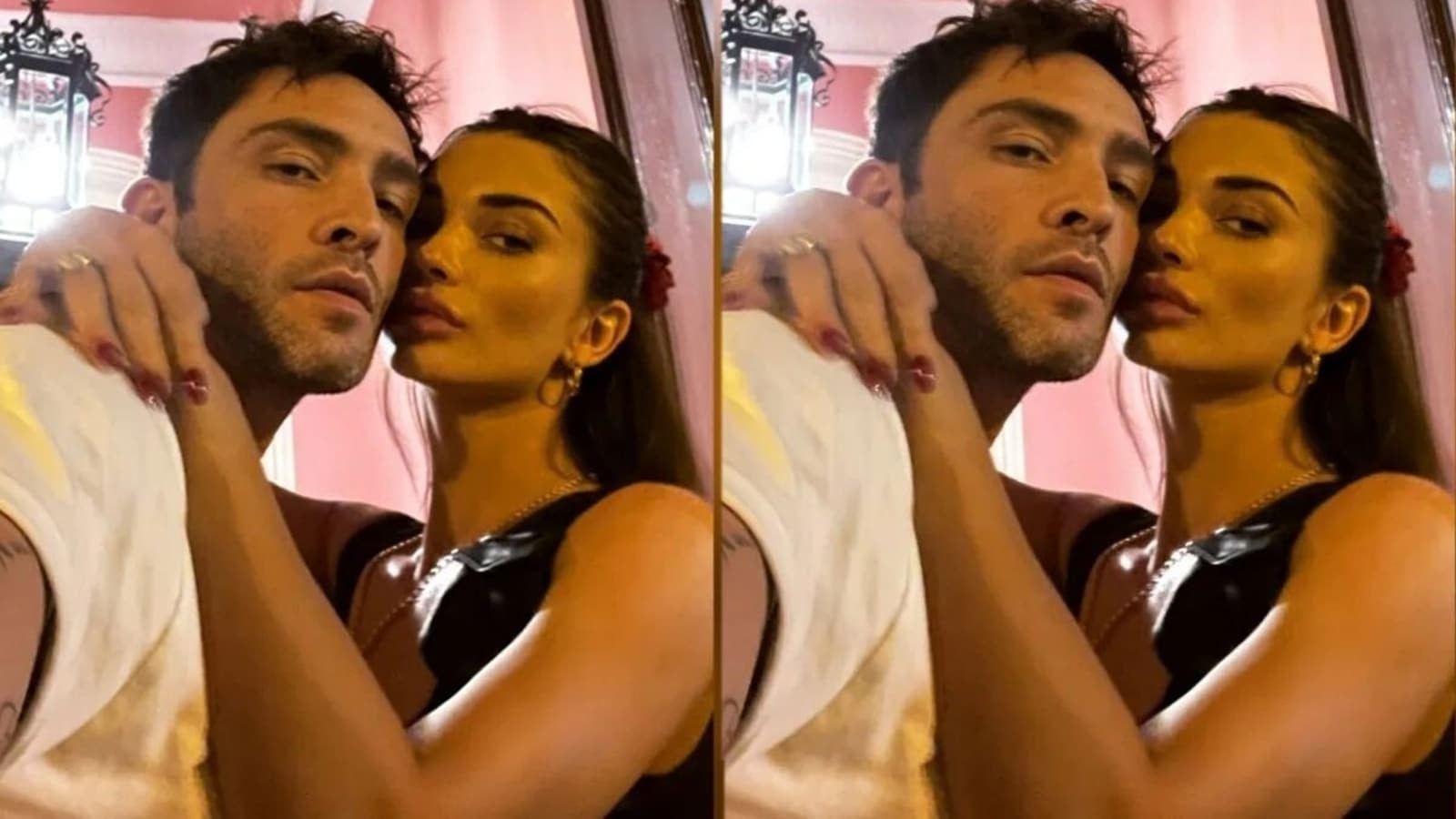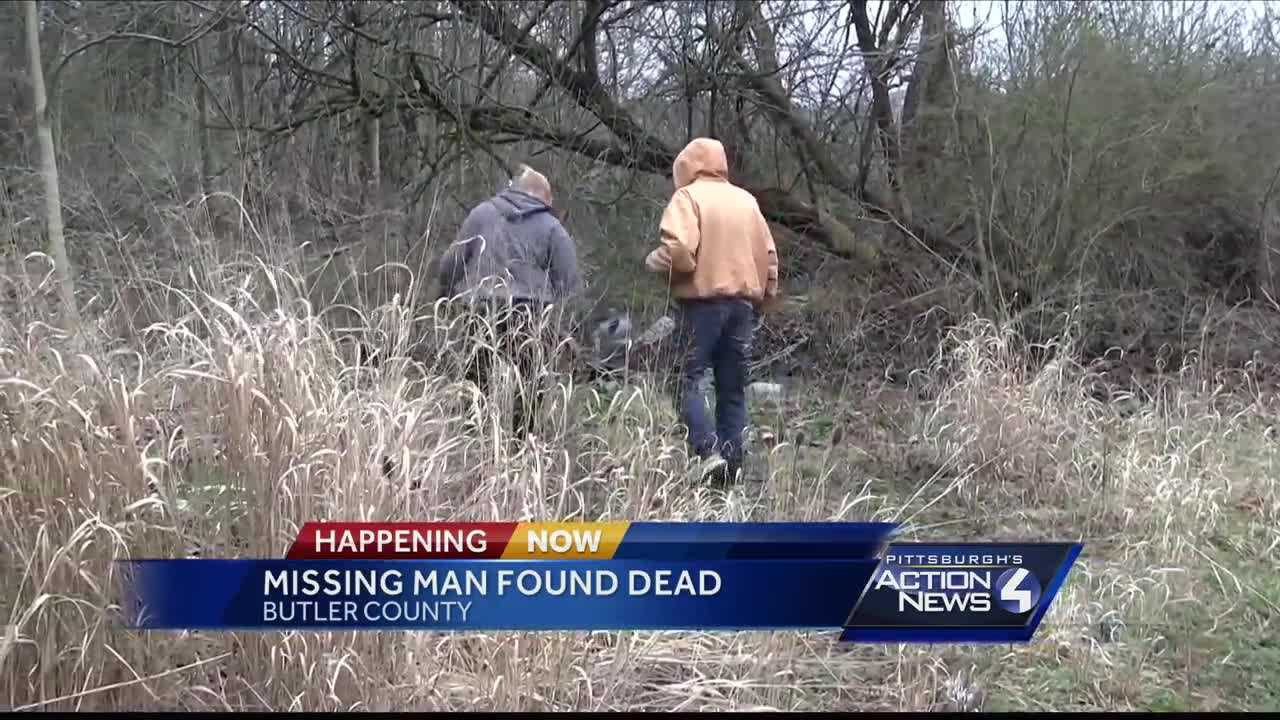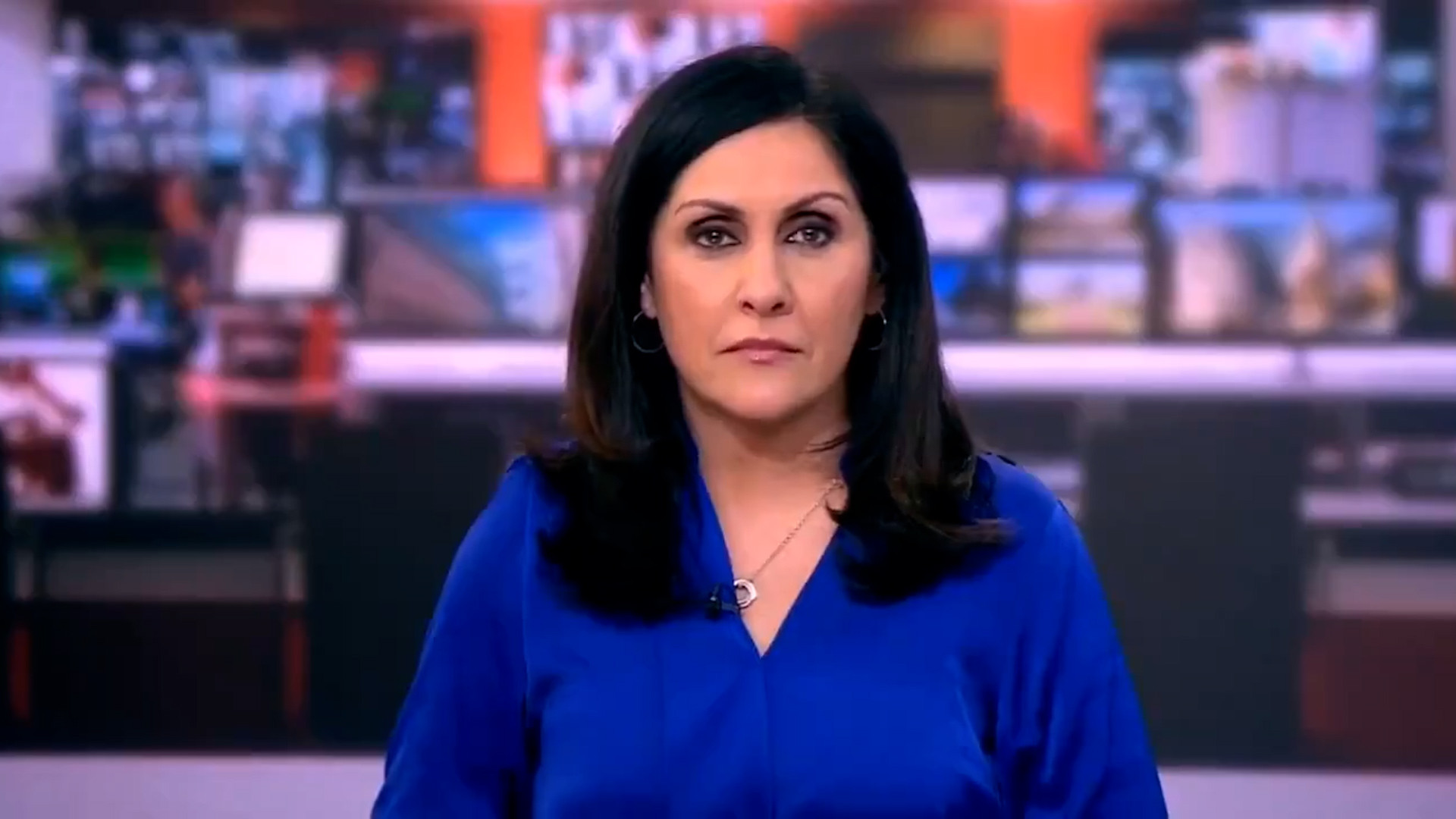After weeks of anticipation, Tell Me Lies viewers finally got some questions answered in the jaw-dropping season two finale of Meaghan Oppenheimer’s addictive Hulu series. But the epic cliffhanger only provokes more questions.
“I always like to leave people guessing,” the showrunner tells The Hollywood Reporter. “I’m always trying to surprise people.”
For a show that thrives on toxicity, season two brought plenty of jaw-dropping moments between the cast led by Grace Van Patten and Jackson White. But the rest of the gang also had their fair share of drama, notably in the finale which saw Wrigley’s (Spencer House) younger brother Drew (Benjamin Wadsworth) die, Bree (Catherine Missal) finding out Oliver’s (Tom Ellis) in an open marriage, Diana (Alicia Crowder) orchestrating a breakup with Stephen, and Stephen bringing the ultimate revenge to Bree and Evan’s (Branden Cook) wedding in the 2015 timeline.
One of the most tragic moments in the finale was Drew’s death, especially after he just reconnected with brother Wrigley. “I always knew that Drew was going to die, and that it was going to be something that Wrigley blamed himself for,” Oppenheimer says, explaining her reasoning behind the tragic death, “But ultimately, the seed of it needed to be kind of Lucy’s fault. And because of that, Stephen’s fault as well.” The showrunner notes that Drew’s death was intended to serve as a collective guilt that would hang over the entire group in the future years.
“I think we needed some real, true communal guilt that could hang over the entire group in the future years,” Oppenheimer says.
“I thought he was going to die at the end of the first season, and it just didn’t end up fitting in and it didn’t make sense,” she continues. “And because Ben is such a lovely person and a great actor, the first few weeks of the [writers] room for season two, I really tried to think about, how could we keep his character in now that he’s been expelled? How could we keep him alive? And there just wasn’t a way.”
Another huge shocker was Bree finding out Marianne (Gabriella Pession) and Oliver [who is played by Oppenheimer’s real-life husband, Tom Ellis] are in an open relationship. But when Bree confronts Marianne as she’s leaving their house and tells her that Oliver said he loved her, Marianne seems surprised. Is that hinting that something could happen with Marianne and Oliver’s relationship in the future?
“Anything that happens in the future is still so undecided that I would never want to lock myself into anything,” says Oppenheimer. “But I think it definitely hints at [how] that was probably not allowed. Marianne and Oliver have rules. The rule is that they are both in on the joke, they are the people who know everything. And I think that saying I love you is not allowed. So I do think that that really does hurt Marianne.”
Viewers also see Stephen and Lucy hook up in the 2015 timeline before Bree and Evan’s wedding. Is it safe to assume they have had something going on between them since college?
“There’s definitely more that needs to happen,” Oppenheimer says. “I would say, at least in the final semester of Lucy’s sophomore year. There is still absolutely more of that cat-and-mouse game, if you can even call it that, because that sounds so mild for what these two do to each other. But there’s more of that dynamic in her second semester of sophomore year and his final semester. In terms of what happens between them in those other years, between college and present day, definitely something. But I think the bulk of it is college.”
I felt like their hook-up also explained why Lucy was being so polite to Stephen in the 2015 timeline, given everything he’s put her through.
“Yeah, and I think she’s polite because I think most people [are polite],” she says. “When I see things on TV and characters are being so blatantly nasty to people, we’re never really like that in real life. I mean, unless you’re a psychopath. I see people who have devastated me in the past and unless it’s like yesterday, I see them when I’m polite and vice versa. I think that’s what we do as people, and I think she blames herself for a lot of what happened in her college years, and has tried to grow and mature. So she tries to at least save face in front of him.”
I also want to talk to you about that wild cliffhanger when Stephen sends Bree that recording on her wedding day, of Evan confessing back in college to cheating on her with Lucy. Have you been planning that since season one?
“Not in season one,” she says. “In season two, I definitely knew that he was going to record Evan saying this thing. Initially, I didn’t think he was going to play it at the end of the finale. I rewrote the ending of the finale very quickly, very last minute. I was on set at [Video] Village and I rewrote it, because initially it was going to be more of a cliffhanger of: Is he going to tell Bree or not at the wedding? And then I decided he’s just gotta tell her; we just have to have that blow up. The long-con is interesting, but I have a lot of Scorpios in my life and I think that there are people who definitely go in it for the long-con, and Stephen is one of them. I mean, my God, he holds a grudge. It’s the big difference between him and Leo’s [Thomas Doherty] anger. Stephen is able to control his anger and then utilize it to his advantage, and when the moment makes sense. It’s very rare that he’s explosive or impulsive. Whereas Leo, obviously we see is different than that. He’s very impulsive.”
“We need to see that. Poor Bree. That’s like the hashtag of the season in my mind, #PoorBree. She’s just been through it. I think she deserves some sort of reaction to this massive betrayal from everyone,” says Oppenheimer.
Lucy and Stephen subvert the expectation of creating leads who are likable. Why did you decide to make them so flawed and, in Stephen’s case, veering on villainous, while also keeping the show gravitating around them?
“Stephen, definitely, is pretty villainous even though he’s also the male lead. It’s funny, I never worried too much about whether a character is likable, as long as there’s someone I want to watch and they’re interesting. That’s what I care about,” Oppenheimer explains. “And to me, it’s actually really surprised me how unlikable people think Lucy is. I mean, I got into a fight with my mom about it the other day. My mom was like, “Lucy’s a bitch.” I was like, “Mom, Lucy is a good person and she’s just had a lot of shit thrown at her.” I like Lucy. I think she’s great. I think she’s very flawed. I think she is very young and immature, but she came into college from a place of trauma that was unresolved and not dealt with. And then she met this master manipulator who made everything worse.”
“We see these women, usually women characters on TV, who act pathetic or messy because of a man, and we like to assume that that means there must be something inherently wrong with them. And I just don’t think it’s true,” she continues. “I think if you look at real life, some of the strongest women I know have behaved very out of character because of their feelings being hurt, or because of falling in with the wrong people.”
You told me before season two debuted that if anything gets you canceled, it would be Lucy saying she was the one assaulted rather than Pippa in episode seven. You also noted that it was very divisive in the writers room. Why was it important for you to include that this season?
“I just felt that was an action that is arguably one of the worst things a woman can do, lie about sexual assault. I was just very intrigued by the idea of, how do we have her do something that is so nasty and icky and universally despised, but for the right reasons?” Oppenheimer says.
“There was a part of me that is saying like “fuck you” to all of society with that, because people don’t believe women and people don’t protect women. And Pippa is in this situation and no one is helping her, and she has no options really, because society is set up in a way that doesn’t help her. So it was sort of a “fuck you” to everyone in the sense of, “OK, you’re not supposed to do this, but no one is helping these girls.” So she’s gonna do the most desperate thing possible, and she’s coming from a place of real helplessness because the system has failed her. It’s failed her friend, it’s failed her classmate. And anything that makes our writers in the room argue with each other, I always lean into those things.”
There are still a lot of missing pieces to the Tell Me Lies puzzle. Do you know yet if you’ll be getting a season three? Also, was it intentional to still leave people guessing?
“I don’t know if we’ll get a season three, who knows? I think the show has had a really wonderful response this season, so I’m very hopeful about a season three,” Oppenheimer says. “I always like to leave people guessing. And I also think some of my favorite shows, even when they end, leave things not completely resolved. I don’t hate those stories that have open endings. So I was sort of of the mind of, let’s have a cliffhanger so that people want to come back and, if we don’t get to answer it, then that’s life (laughs). I’m always trying to surprise people. I’m always trying to surprise the audience, because it’s just very fun to do.”
Tell Me Lies season two is currently streaming on Hulu. Catch up on THR‘s season two interviews with Grace Van Patten, co-stars Sonia Mena and Alicia Crowder, and star Cat Missal, along with Van Patten and Jackson White digging into the season two ending.
When a crime-centered show like Big Little Lies moves beyond the book that inspired it, there is a temptation to bury another body. But season two of Hulu’s Tell Me Lies—a series based on the eponymous 2018 novel by Carola Lovering—wisely keeps all of its characters’ hearts beating, then breaking, just as series creator Meaghan Oppenheimer intended.
“It felt like a better show to me this season,” she tells Vanity Fair in a recent Zoom. “I loved season one, but I felt like Hulu allowed me to take a lot more risks this season. There was a death in season one, the mystery of the dead body, and there’s usually a pressure to have another. I said, ‘How do I avoid that? Because I don’t want another murder.’” Jordan Helman, head of scripted originals at Hulu, had a single directive: “Just don’t bore me.”
After dropping about a dozen bombs, Oppenheimer spoke to VF about writing a teacher-student relationship for the open-marriage era, casting her real-life husband as her show’s dirty professor, and her sixth sense for creating fucked-up characters: “I don’t know how to write something that isn’t a little bit dark.”
Vanity Fair: Going into the season, you said that a storyline involving Lucy had the potential to get you “canceled.” I’m going to guess you were referring to how Lucy handled Pippa being sexually assaulted by Chris, her best friend Lydia’s brother. Lucy falsely claims she was also one of his victims so that he might face some accountability—a decision that totally backfires. Why decide to take the storyline in that direction?
Meaghan Oppenheimer: I knew going into the season that Lucy needed to betray Lydia in some way, sacrificing herself for the sake of one of her friends. [In the 2015 timeline, Stephen and Lydia are engaged.] I don’t know exactly why I got the idea. It was very late at night. I was in bed and my wheels were turning. Then I just thought, what if she says that the sexual assault happened to her? Because that would be a huge betrayal to Lydia, at least in Lydia’s mind, but she’s doing it for the right reason.
When I pitched it to the writers’ room, it was so divisive. Some of the writers were like, “That’s extremely offensive. We can’t do that.” And other writers were like, “This is the show and we have to do it.” So just seeing the conversation, I knew that we needed to do it. I think people are so hard on TV characters. I’m not trying to say these people are examples of what you should do. I’m just trying to hold a mirror up to things that people might do. So maybe it’s just my stubborn streak that when someone says something is offensive, I want to do it.
But also in 2008, the discussions around consent and sexual assault were not what they are today. Girls, especially on college campuses, were left with so little help in these situations. All of us in the room, for the most part, were in college during 2008. So we all had firsthand experiences in this world. There was maybe a bit of anger on my part of just saying, you know what? We’re going to have someone do the most unforgivable thing, because in reality, society and the system did not help this girl. She’s going to do something fucked up because no one else is helping.
Pippa is in such a state of shock that she hasn’t really processed it and decided how she feels about what Lucy did. Things are probably going to get worse before they get better, because that lie needs to have ramifications. Pippa didn’t want the story to continue. She wanted it to be over and done with. Lucy has now done something that accidentally means the story is going to still be around, and she’s going to have to keep thinking and hearing about Chris.
In the season’s penultimate episode, Stephen tells Lucy: “You loved me even though you knew the worst things about me and I loved you knowing the worst of you. That’s why we don’t work with anyone else.” The juicy part is that it makes some sense. Is there a world in which they work through their issues, or are they forever doomed?
We always have to find reasons to believe that these people would still come back to each other. And a very true thing about their dynamic was that they have accepted each other at their worst. He did leave her, but it wasn’t because of the things that she did wrong, and she never gave up on him because of the things that he did wrong. So whether or not they’re good for each other, these two people have accepted things that no one else knows or would accept about them.
Certainly for Lucy, when you’re at rock bottom and you feel like a piece of shit, knowing that someone else accepts that is an incredibly safe and reassuring feeling. I think that’s why a lot of people, when they are in really devastating situations in their lives, tend to gravitate towards people that are not great for them, because they don’t think they deserve better. They’ve just fucked each other up so badly that their broken pieces only work with each other. They’ve worked each other into these shapes that only fit together, unfortunately.
Diana reclaimed her power by orchestrating the breakup with Stephen, which she made look like his idea. What can you say about her romance with Pippa in 2015?
I loved them together so much, and it wasn’t until that episode five ending scene, I was like, this is actually really giving me serious feelings in a nice way. But they have a long way to go from where we leave them in Pippa’s sophomore year. Pippa is much further along in her exploration of her sexual identity. Diana also comes from a family that is not going to be as okay with her being in a relationship with a woman. That probably creates some tension between them, where Pippa is willing to be honest about what they are sooner than Diana is.
Bree’s affair with her married professor Oliver is unraveled after she discovers his wife, Marianne, was totally aware of it. I’ve never seen a teacher-student storyline unfurl like that, where the spouse is supportive of the infidelity.
We knew early on in the room that there was going to be this affair, and it was going to be with Marianne’s husband. Then I was just thinking about the different forms of consent. I had watched I May Destroy You, which I think is one of the best shows ever, and the moment that really haunted me was when the character has the threesome with two men, she thinks it’s all happened organically. Then she sees them walk out and high five and she realizes they were in on it together. The worst thing about feeling cheated on or lied to is knowing that two other people had a secret that you didn’t know about.
Bree believes that she has this secret with Oliver. The worst thing that could happen is to realize that she was never actually in on the secret—it was this game that these other two people were playing. The student-teacher trope has obviously been done before, and I wanted to find a way to subvert expectations. I’m glad that people have thought that was as devastating as I do. I feel so badly for Bree, and I was worried that people would not have empathy for her.
But Marianne makes a good point when she asks Bree, “You preferred it when I was just some clueless wife having her life ruined behind her back while you fucked her husband?” How did you navigate writing a character who has these complex feelings about her husband’s extramarital affair?
I’m always fascinated by open relationships. I don’t understand how people do it. I think it’s absolutely fucking crazy. What I have learned from a lot of my friends that have them is usually there is one person who actually wants it, and one person who’s doing it to keep the other person. Not always, obviously. For some people it totally works. But I think that is a very common thing. It’s fun to create the backstory of all the things we never actually reveal in the show, this idea that Oliver’s dead first wife was probably the person he loved more than anyone, that was taken away from him very young, and it damaged him. Now Marianne is left with a slightly broken man to love, and he’s giving her the most that he can give her. But it’s not everything.
Then Marianne has the audacity to tell her fellow student Lucy, “I’m just grateful he didn’t meet you first.” In my notes I wrote down, “Wild!” Please tell me we’ll see more from this couple.
Yeah, they’re insane. Marianne and Oliver need a whole spinoff. I’ve always anticipated that Marianne would need to come back. I hadn’t planned on Oliver coming back, but I’ve had so many questions about what happens next for him. I wasn’t anticipating people having so many unanswered questions about him, and where there are questions, there’s definitely potential for story.
I love that last scene. That line had not been in there originally, and it was Gabriella that was like, “I just need her to say something else to Lucy. I need one moment of closure.” I was like, “I don’t think that she should get closure, but I can give you something more fucked up to end with.” So I pitched that line to one of our writers, Victoria [Bata], who was like: “Oh, that’s gross. Yeah, you gotta say that.”
Oliver is played by your real-life husband. How did you navigate keeping your professional and personal ties separate?
My own life experiences obviously influence the show, but our relationship does not bleed over at all into Marianne, Bree, Oliver. He just trusted me. Honestly, the main thing that he would have opinions about was if something sounded British. He’d be like, “Well, I would never say this because this is so fucking American.” So that was the main thing. We talked at length about who Oliver was. Tom naturally is so charming and lovely and warm and sweet that I had to really get him to pull back, become colder, because I really didn’t want Oliver to seem like he was coming on to Bree in the beginning. There’s something that happens when a good-looking guy is too smiley. It just looks like they’re flirting even when they’re not. So I had to be like, “Stop smiling.”
When we talked about the season one finale, you referred to the final moments as an “asshole-cliffhanger ending.” You’ve done it again with season two. What can we expect Bree’s next moves to be after hearing Stephen’s recording of Evan confessing to having sex with Lucy?
We need some justice for Bree, some sort of revenge. A lot of people have done her very wrong. That was not in the original ending. I always knew that Stephen was going to record Evan’s confession. When Evan says, “Are you going to ruin my life?” Stephen says, “Not today.” I think people know, oh shit, he’s using this. Initially, we were going to see him walk up to Bree and be like, “Hey, I need to talk to you,” and then leave it at that. But then I just decided that was less dramatic and fun. In reality, Stephen would drop the bomb and already be in a getaway car.
Who is Bree seen intensely talking to on the phone the night before her wedding? Anything you can share about that?
I can’t. That was another thing that was not in the script originally, and I ended up adding it just because we realized Bree has been through so much in 2008. There’s no way she’s stable and functioning perfectly in 2015. So we’re like, okay, we’ve got to fuck her up a little bit more in 2015.
You have described your next series, Second Wife—which stars your husband and Tell Me Lies executive producer Emma Roberts—as “Stepmom meets Fleabag.” What can you say about it?
It’s certainly a dark comedy. I have realized I don’t know how to write something that isn’t a little bit dark. It’s probably going to be more relatable to people because it’s not quite as heightened. Tell Me Lies is so toxic, so crazy. What interests me the most in any story is the things people do behind closed doors. People are genuinely shocking, especially what they do when they’re trying to be loved. It’s one of the most vulnerable positions to be in, is to be trying to get someone to love you. Second Wife is definitely a show about three people pursuing love, and trying to figure out why they have not been loved properly or why they have failed loving properly before.
Does your new project and Grace’s role as Amanda Knox in an upcoming Hulu limited series delay the timing of season three?
I’m so excited about that. I have no idea. I know that Hulu won’t make a decision for a while. They actually have a certain amount of weeks that they have to wait before they can even make a decision. So I’m just trying not to worry about it too much, and see where the pieces fall when they do. It would be wonderful to have a third season.
You’ve said that this season is more of a war story than a love story. By the end of season two, who do you think is winning?
Stephen has unfortunately won, for now, in terms of his pursuit of revenge and destroying other people. And Diana has won in the realest sense, because she actually got out of the bullshit and is going to be okay. If you’re dealing with a person who is truly that toxic, you can never really win. Lucy’s never going to beat him in that game because she’s not a terrible person. So sometimes it’s not a bad thing to lose in that game—to not be the worst person.




